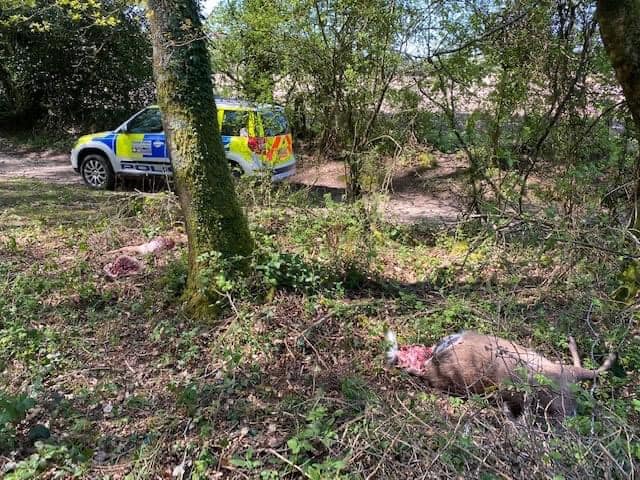Rural crimes can be violent, costly and yet are often misunderstood, requiring an entire community approach reports Andrew Livingston.

For over two and a half years Police Constable Sebastian Haggett has been deterring and solving rural crime in Dorset, including many ‘Hot Fuzz’ moments such as hiding in bushes for poachers. In North Dorset, a lot of the Rural Crime Team (RCT) time is spent hunting poachers who engage in the illegal activity of hare coursing, whereby individuals trespass on private land with vehicles and dogs to chase, catch and kill brown hare, causing serious damage to land and crops.
Speaking with the BV magazine, the 31-year-old police constable explained why North Dorset is a prime location for hare coursing. ‘“’The north and east of Dorset see increased levels of activity because of the large flat open fields favoured by brown hare.’
For two years now, Operation Galileo has been in effect nationwide to clamp down on hare poaching; the operation involves sharing intelligence between different forces. PC Haggett states that Dorset police works closely with Hampshire and Wiltshire.
“In January 2022 we conducted a joint evening operation with Hampshire and Wiltshire Police which saw the arrest of two individuals for poaching and a vehicle seized in Dorset.
New laws include jail time
New laws have recently been emplaced to further clamp down on the illegal activity. The changes, which came into effect on the 28th of April, mean that poachers found guilty can now face up to six months in jail.
Nine days prior to the changes in law, three men from Essex and one from Cambridgeshire pleaded guilty to the charges of trespassing in the pursuit of game after being caught by the Rural Crime Team in North Dorset. In total, the four men were fined £3,255 in the Poole Magistrates Court on April 19th.
“We are committed to working with our rural communities as well as our national and local partners
and take reports of this nature seriously. In this case, we were able to detain the offenders at the scene and subsequently bring them before the courts.”
Since 2020, there has been a 20% reduction in rural crime. The Dorset Constable believes that this is due to much better cooperation with more than just other police forces.
“In the case of fly-tipping, we work with the Council to share intelligence on top offenders. I can’t go into the specifics of the tactics being used, but we are seeing positive outcomes from that effective
working partnership.” Constable Haggett went on to explain the difference in working within the RCT as
opposed to the neighbourhood units. He said: “In the RCT our base is to look at agricultural, heritage, wildlife and waste crime. However we will sometimes investigate other elements if our ‘core offenders’
are involved in that area of criminality. This allows us to disrupt and deter those repeat offenders.”
Sharing their stories
Under 20% of the UK population lives in rural areas and that, coupled with the fact that only 1.7% of the UK
workforce is in agriculture, contributes to a lack of public awareness of crimes that affect the countryside.
Despite this, PC Haggett believes that there is a growing awareness of rural crime and its effects. He went on to say: “there is a growing number of Rural Crime Teams being created nationally, charities such as Crimestoppers are running rural-crime-specific campaigns, and there is even a university course around rural and environmental crime. “We are keen to share the stories of farmers to help increase public awareness of rural crime. On Facebook we have used #ruralcrimestories to publish stories allowing the
victim to share with members of the public what had occurred.
One of the important roles of the Dorset Rural Crime Team is to prevent crimes from occurring in the first place. The four men arrested and charged in Poole in April were caught due to a report from a civilian who noticed suspicious activity.
“It is important to report all incidents of rural crime, but also any suspicious incidents. The latter often remains unreported, but is important; they can be the ‘final piece’ in the puzzle we need to take action against a suspect.
Partnership with farmers
“Intelligence is the lifeblood of our work, telling us who is causing the most harm and where these incidents are happening.” Constable Haggett and the rest of the team also work with farmers to help ensure that everything is being done on farms to prevent thefts from occurring. “Should a farmer want to have a free crime prevention survey they can get in contact. I would also advise any rural business or farmer to make sure they are signed up to Farmwatch so they know what is happening locally – this may include suspicious vehicles to look out for.”
Rural Crime Stories:
“I want to remain anonymous because I don’t want poachers to know this is me talking and target my land in the future. The truth is, I must speak out and I am glad to have this opportunity to do so.
The modern day ‘poacher’ is not trying to feed their family. They used to drive across my crops night after night, destroying hedges, gates and anything else that came into their path. They did so under the cover of darkness, their acts shielded by the remoteness of the farm.
My fields had become a playground for the most barbaric and pointless crimes where they would film their activities, sharing them live to others who would be betting on the outcome – what dog will get the kill? How
long will it take? Who will get the deer with the biggest antlers?
It wasn’t just about the economic loss. It was truly barbaric how some of these animals were killed. When it was at its worse, in my frustration, I blamed the authorities and felt helpless.
Rural Crime Stories:
“I am a sheep farmer. I often do a 14 hour day with early starts, seven days a week… I am always ‘on call’ to tend and look after my livestock.
I have been a victim to livestock theft on a number of occasions. How does that make me feel? Angry, to tell you the truth. When you spend a good portion of your life rearing livestock, to have them stolen feels personal – this job is part of everything I am.
I think sometimes people don’t understand rural crime, especially those not involved in the agricultural sector. That’s why its so great to be able to highlight ‘our side’ of the story.
The last time I had sheep stolen the police put out a public appeal on social media. I read some of the comments and it shocked me. One suggested the crime hadn’t happened, that this was just an insurance claim because the offence timeframe was wide. I think they didn’t realise that whilst I count my sheep on a regular basis, I cant count them everyday! If you owned hundreds of sheep in a field, would you notice 20
missing straight away?
Likewise people always suggest investing in crime prevention; of course it’s important but I think people need to understand how this is difficult for farmers. The idea that a farmhouse is situated in the middle of its land is not always a reality. Farmers often have fields dotted in multiple areas, making watching over it
difficult. Likewise, securing all the access points to stop vehicles is both costly and difficult, especially if you are a tenant farmer and the land you are investing in is not yours!

I can strive for strong perimeter fencing, but what I can’t do is turn our fields into a fortress. Not only is ease of access important for farm vehicles, its also important to keep bridleways and footpaths open so others can enjoy the countryside.
In the past I have had secure metal gates simply rammed by suspected poachers, and fences have been cut. When this happens, I wake to find my livestock all over the place, walking in roads and causing a danger to road users and themselves.
Its important we share our stories and talk about it. It’s important people understand. When we understand it, we can tackle it.
by Andrew Livingston


